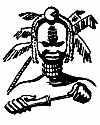 Natives on the island of Samoa in trying to find a means of making fire
suitable for their island hit upon a new
idea. They carefully fitted a wooden plunger to a hollow section of
bamboo which was closed at one end. Then they put a piece of dried moss
on one end of the plunger and placed it in the hollow section. By
striking the other end of the plunger sharply with the hand it
compressed the air in the cylinder. If this is done very quickly the
heat in the air will ignite the moss. Diesel saw one of these South Sea
pocket lighters in Augsburg, Germany - and his idea for the compression
ignition engine was born. At about the same time Herbert Stuart, an
Englishman, also worked with the same type of engine. This idea had
been growing and expanding over all these years from a simple
lighter in Samoa to a power machine in Germany and England.
Natives on the island of Samoa in trying to find a means of making fire
suitable for their island hit upon a new
idea. They carefully fitted a wooden plunger to a hollow section of
bamboo which was closed at one end. Then they put a piece of dried moss
on one end of the plunger and placed it in the hollow section. By
striking the other end of the plunger sharply with the hand it
compressed the air in the cylinder. If this is done very quickly the
heat in the air will ignite the moss. Diesel saw one of these South Sea
pocket lighters in Augsburg, Germany - and his idea for the compression
ignition engine was born. At about the same time Herbert Stuart, an
Englishman, also worked with the same type of engine. This idea had
been growing and expanding over all these years from a simple
lighter in Samoa to a power machine in Germany and England.Whether it is a composer working with combinations of notes, or an inventor working with combinations of materials, these original thinkers seem to have many things in common. First, there is the desire and ability to create - to do something original - something no one has ever done or been able to do before. Second, there is the quality of persistence, the urge to keep going until it is finished - regardless of surroundings, poverty or health. Third, there is that dissatisfaction which seems to be the standard equipment of these men. Regardless of how outstanding their work appears to the world, they themselves are never satisfied with it and are sure if they had it to do over they could have done a better job. |








